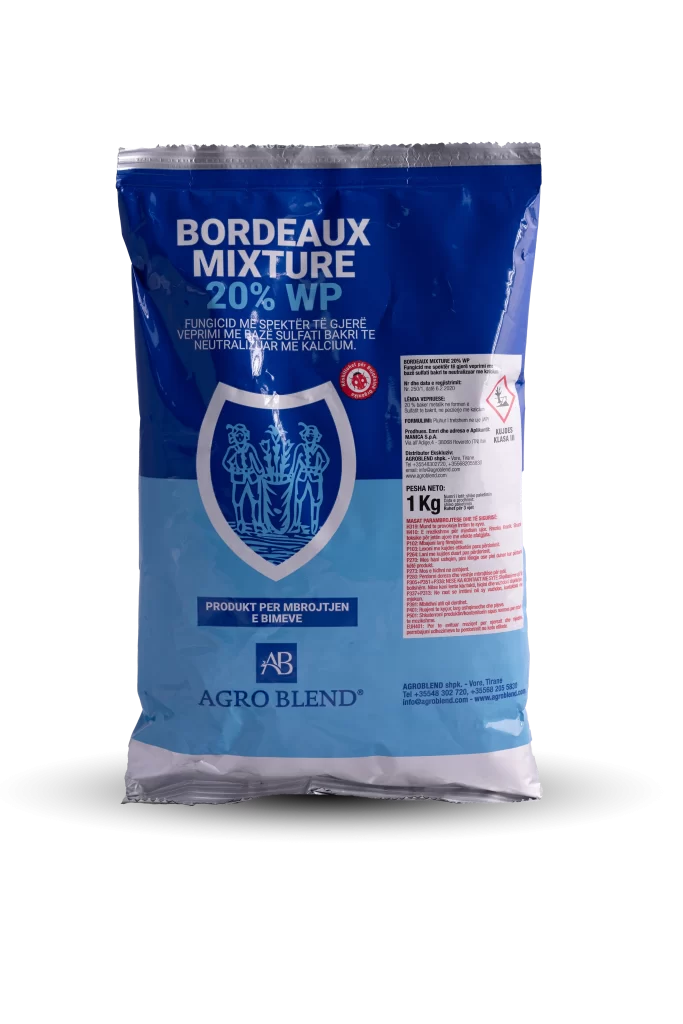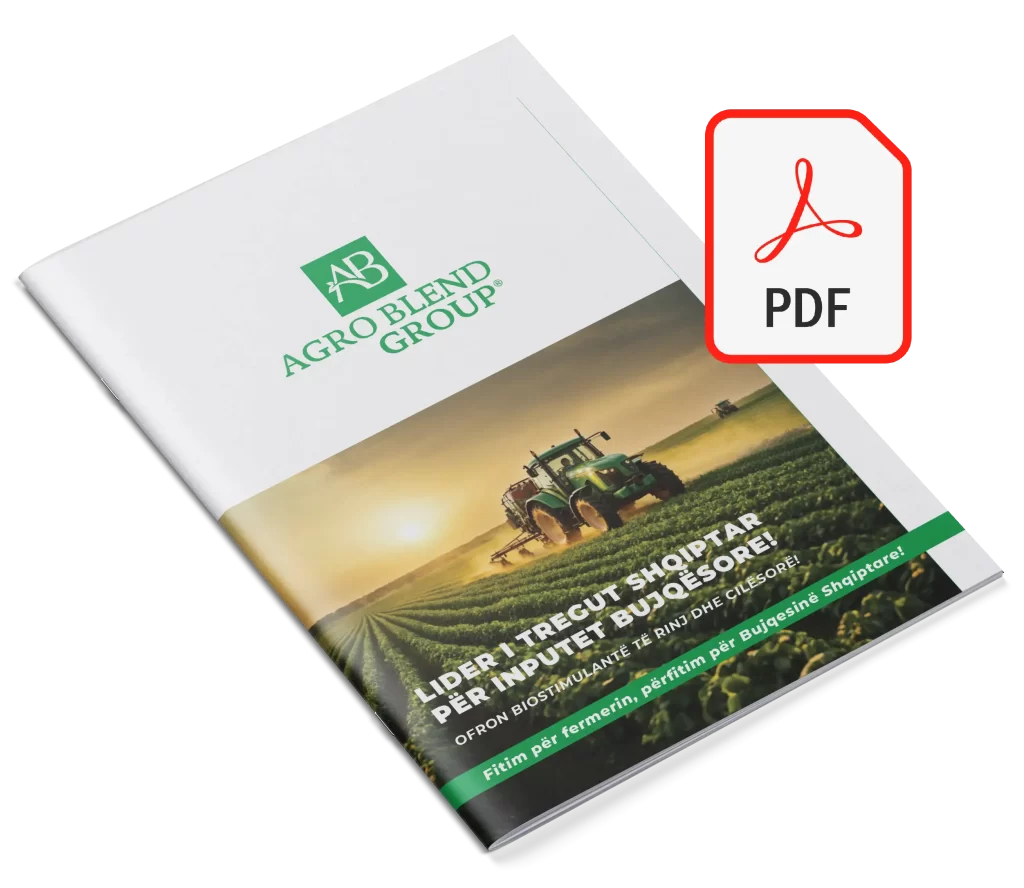
Weight: 1kg
Formulation: Water-soluble powder (WP)
Type: Contact fungicide with preventive and curative action
Bordeaux mixture is a broad-spectrum contact fungicide used as a preventative against a wide range of fungal diseases sensitive to copper.
Thanks to its special formulation and the perfect copper-calcium combination, the product is ideal for ensuring uniform coverage for the crops where it will be used.
Please consult the technical service for advice on specific crops and conditions.
First aid instructions and medical advice:
• H318: Causes serious eye damage. P305 + P351 + P338:
IN CASE OF EYE CONTACT: rinse with plenty of water and soap for several minutes; remove contact lenses and rinse thoroughly.
• In case of skin or mucous membrane contact: rinse with plenty of water and soap.
• In case of inhalation of spray solution with respiratory organs: move the affected person to a warm and ventilated area.
• P310: Seek immediate medical attention or go to an anti-poison center.
THERAPY: Stomach lavage with milk and egg whites, and in cases of high copper levels,
use gel-forming substances like penicillamine orally or CaEDTA and BAL intramuscularly.
Phytotoxicity
Do not apply during blooming. This product may be phytotoxic to crops not mentioned on this label. On peach, apricot, and certain apple varieties (Abbondanza, Belfort, Black Stayman, Golden Delicious, Gravenstein, Jonathan, Rome Beauty, Morgenduft, Stayman, Stayman Red, Stayman Winesap, Black Davis, King David, Renetta del Canada, Rosa Mantovana) and pear varieties (Abate Fetel, Buona Luigia d’Avranches, Butirra Clairgeau, Passacrassana, B.C. William, Dott. Jules Guyot, Favorita di Clapp, Kaiser, Butirra Giffard), which are sensitive to copper, Bordeaux mixture can be phytotoxic if used during rapid vegetative growth. In such cases, non-use is recommended.
Environmental Impact:
H410: Very toxic with long-lasting effects on aquatic organisms.
P273: Avoid release into the environment. Do not pollute waterways, ditches, or ponds with the spraying solution or packaging.
P391: Collect spillage.
Waiting Period (Pre-Harvest Interval):
• 3 days for strawberries, potatoes, tomatoes, eggplants, root vegetables, bulb vegetables, cucurbits.
• 7 days for leafy crops and fresh herbs.
• 40 days for stone fruits.
• 20 days for other crops.
Storage:
Store in the original containers in dry, ventilated areas at temperatures between 0°C and 35°C.
Usage:
Bordeaux mixture is a broad-spectrum contact fungicide used as a preventive measure against a wide range of fungal diseases sensitive to copper. Thanks to its special formulation and the perfect copper-calcium combination, the product ensures uniform coverage for crops where it will be applied.
Solution Preparation:
Dissolve the required amount of product in a small quantity of water, then pour it into the tank filled with the necessary amount of water, mixing continuously. The product is neutralized, and no lime should be used.
Bordeaux mixture should be applied according to the calendar norms for control, with intervals of 7-12 days, depending on temperature and humidity conditions. During seasons with heavy rainfall, larger doses and shorter treatment intervals should be used.
It is compatible with main antiparasitics, especially with sulfur formulations.
Usage Notes & Compatibility:
Treated seeds that have been in excess after sowing should not be used as food for humans or animals. Do not apply against the wind.
In case of mixing with other formulations, the longest waiting period should be followed. Also, carefully observe the guidelines for products with higher toxicity.
Please consult the technical service for additional advice on compatibility.
CAUTION:
It should be used only in agriculture; any other use may be dangerous. Following the instructions is essential to ensure treatment effectiveness and avoid damage to plants, humans, or animals.
Precautionary Measures:
• Keep in a safe place out of reach of children.
• Store in a dry, cool place, away from food and beverages for humans, as well as animal feed.
• Avoid prolonged contact of eyes and skin with the product.
• Avoid inhalation of the product while preparing the spraying solution and during spraying.
• Do not eat, drink water, or smoke during use.
• P280: Wear gloves, appropriate work clothes, goggles, and a face mask.
• After finishing the work, wash protective equipment and spraying tools.
• After completing the task, wash hands and exposed body parts.
• EUH401: To avoid risks to human health and the environment, follow the usage instructions.
• P501: Dispose of containers in accordance with the current regulations.
| Active Ingredients | |
|---|---|
| 20% metallic copper in the form of copper sulfate, blended with calcium | |
| Crop | Parasites | Time of Use | Dosage |
|---|---|---|---|
| Vine | Downy mildew, anthracnose, black rot, secondary action against Botrytis |
- treatments before flowering - treatments after flowering - treatments for closure |
600-700 g/hl 700-1000 g/hl 800-1000 g/hl |
| Pome fruits (Apple, pear, fig) | Scab, monilinia, septoria, branch canker, alternaria |
- treatments in autumn - treatments before flowering - treatments after flowering |
800-1600 g/hl 700-1000 g/hl 800-1000 g/hl |
| Olive | Peacock eye, anthracnose, and other bacterial diseases | Treatments at the end of winter | 800-1200 g/hl |
| Kiwi | Neck rot | 10-15 liters of solution based on the trunk | 800-1200 g/hl |
| Strawberries | Powdery mildew, rot, anthracnose | Vegetative start | 500-1000 g/hl |
| Rice | Green algae | As soon as the first signs appear | 6-10 kg/ha |
|
Crop: Vine Parasites: Downy mildew, anthracnose, black rot, secondary action against Botrytis Time of Use: Treatments before flowering, after flowering, and for closure Dosage: 600-700 g/hl, 700-1000 g/hl, 800-1000 g/hl |
|
Crop: Pome fruits (Apple, pear, fig) Parasites: Scab, monilinia, septoria, branch canker, alternaria Time of Use: Treatments in autumn, before flowering, and after flowering Dosage: 800-1600 g/hl, 700-1000 g/hl, 800-1000 g/hl |
|
Crop: Olive Parasites: Peacock eye, anthracnose, and other bacterial diseases Time of Use: Treatments at the end of winter Dosage: 800-1200 g/hl |
|
Crop: Kiwi Parasites: Neck rot Time of Use: 10-15 liters of solution based on the trunk Dosage: 800-1200 g/hl |
|
Crop: Strawberries Parasites: Powdery mildew, rot, anthracnose Time of Use: Vegetative start Dosage: 500-1000 g/hl |
|
Crop: Rice Parasites: Green algae Time of Use: As soon as the first signs appear Dosage: 6-10 kg/ha |

For a list of all the products & information on their usage.